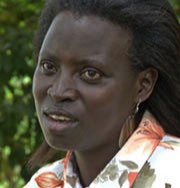Encounters with conflict and peace
Educating the community

So they allowed about two years to develop the system, train the judges and educate the population. Josephine Munyeli was one of the people responsible for explaining the new gacaca process to the community.
"We went out into the community and explained the law, explained the benefits for survivors, the benefits for criminals and the benefit for the community.
We went into prisons and explained the need for healing, for accepting you were wrong and for asking forgiveness. We taught them about the need to see justice done, the need to punish the wrong-doers and the benefits of being forgiven - it was all provided for in gacaca law."
A test run: dramatic results
“We started bringing prisoners into the villages as a test for gacaca. They were brought back into the communities where they had been living so that the people could see them and say, “this one is innocent, this one did this, this one did that…” And even in that quick process some people were released from prison.
"But the prisoners could see the audience too, and they’d point to people and say, “Why is that person not in prison? You’re asking us to tell the truth about who did these things and here they are among you! We were together in the killings."

“Whoever confessed would see their penalty reduced, because you cannot confess and remain the same. Confessing is something that changes people.”
Josephine
"When the gacaca started properly we took an inventory of the people who were living in the community, the people who were killed, the way they were killed and the people who saw it. We got a picture of the community.
"And whoever confessed would see their penalty reduced, because you cannot confess and still remain the same. You know, confessing is something that changes people. Some people confessed just to get a reduced sentence, but the community sees that and if they decide you are not telling the truth, your confession is not accepted.”

"And whoever confessed would see their penalty reduced, because you cannot confess and still remain the same. You know, confessing is something that changes people. Some people confessed just to get a reduced sentence, but the community sees that and if they decide you are not telling the truth, your confession is not accepted.”

Inyangamugayo: the judges
As gacaca was being set up in 2001, across 11,000 local communities 250,000 local judges were chosen. To be a gacaca judge, you had to be a Rwandan national over 21 years old with no criminal convictions; you had to be known as an honest, trustworthy person; you could NOT be a government official, a trained judge or lawyer or a member of the police force, the armed services or the clergy. About 35% of the gacaca judges chosen were women.

The government is now looking at ways to use all that experience and leadership in other areas of public administration, including the ‘ordinary’ legal system, handling non-genocide related crimes.
Related pages
My friend the killer
ORIGINS OF CONFLICTBefore the genocide, Josephine became friends with one of the interahamwe militia. "I ran into a group of them armed with machetes and grenades. They started pushing me around... watch
A good man
GENOCIDEJosephine tells the story of how her father was killed during the genocide.
"We know you're a good person but we have orders to kill you, so this is what we're going to do... watch
An overloaded justice system
RECOVERY: GACACAJosephine was part of a team which educated communities about the need for a new restorative justice system. “Traditionally, when someone did something bad, he was brought to the community to explain what he had done - and why he did it - and the community would decide how to deal with that.” ... more
Making amends for murder
RECOVERY: JUSTICEJosephine lost more than sixty relatives in the genocide. How do you do justice for that, she asks... more
Long term effects of genocide
TODAYJosephine said, "What is being done in the healing work is like a drop in the ocean. So there are still people who haven’t yet been given the opportunity to talk about their stories and now, after more than 10 years, it is becoming too much..." watch video
< previous page | next page >
In this section
AN EXPERIMENT IN RECOVERY
Back from the edge
Experiment in recovery
A new Rwanda
JUSTICE
An overloaded system
The importance of justice
Teaching gacaca
Confronting the past
Soft justice?
Has gacaca delivered justice?
PEOPLE WHO KILLED
Helping killers
Sorry
MIND DAMAGE
Recovering from genocide
Living with the pain
Obstacles
Where does it hurt?
BUILDING PEACE
Breaking the cycle
Building peace

Back from the edge
Experiment in recovery
A new Rwanda
JUSTICE
An overloaded system
The importance of justice
Teaching gacaca
Confronting the past
Soft justice?
Has gacaca delivered justice?
PEOPLE WHO KILLED
Helping killers
Sorry
MIND DAMAGE
Recovering from genocide
Living with the pain
Obstacles
Where does it hurt?
BUILDING PEACE
Breaking the cycle
Building peace

